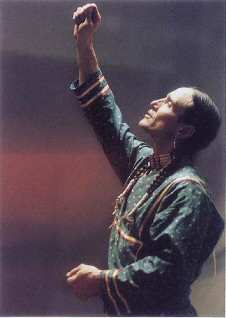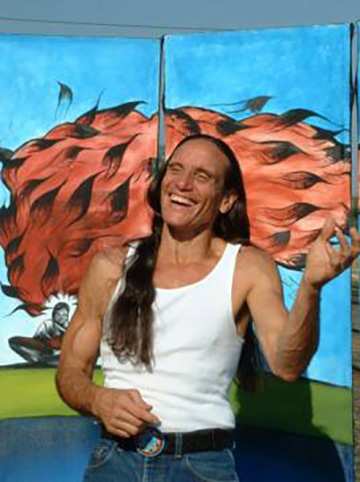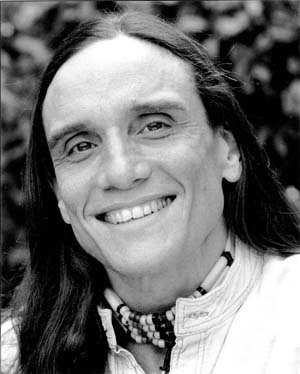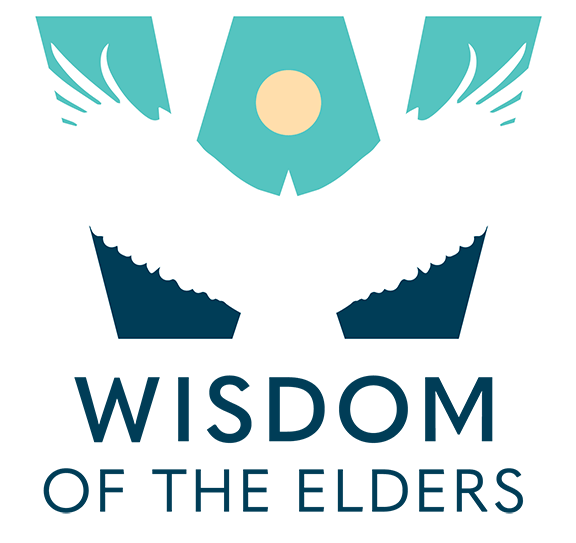I’m a storyteller and a singer. I’ve been recognized by many different elders from many different tribes and given their blessing to go and talk to the two-leggeds – the people. That’s why I’m talking with you today to share cultural knowledge, spiritual knowledge, and stories that are fun and entertaining as well as full of lessons and teachings about how we should live as human beings on Mother Earth.
As a singer and a storyteller, I have traveled quite a bit all across Turtle Island and other parts of the world. Turtle Island as you may know is the North American continent: Canada, the United States, and part of Mexico. A lot of native American people in these modern times have borrowed that concept from the people who lived around the Great Lakes – the different tribes around there. They say that there was a giant flood and after the flood, a great turtle raised up and she had mud on her back and all of life came back to this place, what some call the North American continent, we refer to as Turtle Island.
So I want to thank you for having me here today and it’s probably time to sing a pow-wow song or play my flute or tell a story or maybe I’ll tell you a joke and we can be laughing around together. Good one. Thank you for listening, my relatives, and in just one moment I’ll get a song up and we’ll play you a little something on the economy – the one that says you can make a voice.
Robert Greygrass
 Robert Owens changed his name to Robert Greygrass for the acting industry and in respect and honor to the sage plant. In the Lakota language, sage is greygrass. Robert’s Lakota name is Tagniokikpeensi, afraid of nothing. He is Lakota, French and Irish. Robert is the first in three or four generations to come forward to the Red Road and appreciate his Indian heritage. Originally the Lakota people occupied all of South Dakota, North Dakota, Wyoming, Nebraska, Minnesota, and up into Canada. The area has shrunk down to four reservations: Pine Ridge, Rose Bud, Standing Rock, and Yankton Devils Lake. Inland there are open rolling plains of grass, lower riverbed, and creek bed areas clustered with stands of cottonwoods, ironwoods, and maple. In the high plains, that range in elevations of 4,000 to 6,000 feet, there are pine trees, beautiful chokecherries, buffalo berries, golden yellow plums, red willow, and medicine plants. There’s thunder and lightning, tornadoes, glorious storms, hot summer days, and sunny bright cold winters.
Robert Owens changed his name to Robert Greygrass for the acting industry and in respect and honor to the sage plant. In the Lakota language, sage is greygrass. Robert’s Lakota name is Tagniokikpeensi, afraid of nothing. He is Lakota, French and Irish. Robert is the first in three or four generations to come forward to the Red Road and appreciate his Indian heritage. Originally the Lakota people occupied all of South Dakota, North Dakota, Wyoming, Nebraska, Minnesota, and up into Canada. The area has shrunk down to four reservations: Pine Ridge, Rose Bud, Standing Rock, and Yankton Devils Lake. Inland there are open rolling plains of grass, lower riverbed, and creek bed areas clustered with stands of cottonwoods, ironwoods, and maple. In the high plains, that range in elevations of 4,000 to 6,000 feet, there are pine trees, beautiful chokecherries, buffalo berries, golden yellow plums, red willow, and medicine plants. There’s thunder and lightning, tornadoes, glorious storms, hot summer days, and sunny bright cold winters.
Robert’s gift of purpose is to be a storyteller, actor, and activist. He has years of traditional spiritual practices; sweats, vision quests, Sundance, listening to the Elders, learning the Lakota language, stories, and years of activism with the American Indian Cultural Center. Some of his stories include the signature story of the Lakota people; where the chanupa, sacred pipe, comes from. The great flood story tells of how the pipestone was created. The flood swooped up the last of the people and crushed their bones along the ridge in Pipestone, Minnesota. When the water receded their blood and bones turned to stone. The chanupa is created from this stone.
A personal contemporary story is about D White Dog. When his son was eleven he had a white Pit Bull/Labrador dog. The dog was killed in a car accident. Jarrod Robert’s son had a dream of the dog and an owl. The dog came to him in dreams and told him things and through those dreams, the son learned a lot about prayer, understanding culture, grief, and owl Dreamtime.
Robert is also big on wellness. He has worked with at-risk youth on reservations, schools, summer camps, and shelters for over fifteen years. In his visits to schools, festivals, and summer camps he always delivers the message of wellness. Live in sobriety. Live on the Red Road, Cankuluta, and put aside all poisons; physical, emotional, intellectual, or spiritual and take up the beautiful values, practices, customs, and culture.
 He was invited on stage with the Oregon Shakespeare Festival for two years and on their highly acclaimed school tour program for two years. Since then he has written and toured his one-man play, “Walking on Turtle Island” across the United States (Turtle Island), British Columbia, Australia, and Germany. He premiered his second one-man play, Ghost Land of An Urban Indian, in 2003. He Premiered both plays in Los Angeles, California in 2005. He’s also had poetry published, copywriten his two one-man plays, in 1994 portrayed John Merrick in Elephant Man, was awarded for Best Actor of the Year in 1993 and 1994, in plays “Crazy Horse” and “Blackelk Speaks”, in 1999 was chosen by Word Craft Circle of the Americas as the best storyteller of the year, he received a fellowship from the Oregon Arts Commission and grants from the McKenzie River Gathering.
He was invited on stage with the Oregon Shakespeare Festival for two years and on their highly acclaimed school tour program for two years. Since then he has written and toured his one-man play, “Walking on Turtle Island” across the United States (Turtle Island), British Columbia, Australia, and Germany. He premiered his second one-man play, Ghost Land of An Urban Indian, in 2003. He Premiered both plays in Los Angeles, California in 2005. He’s also had poetry published, copywriten his two one-man plays, in 1994 portrayed John Merrick in Elephant Man, was awarded for Best Actor of the Year in 1993 and 1994, in plays “Crazy Horse” and “Blackelk Speaks”, in 1999 was chosen by Word Craft Circle of the Americas as the best storyteller of the year, he received a fellowship from the Oregon Arts Commission and grants from the McKenzie River Gathering.
He lectures and performs in universities, community colleges, and wellness workshops throughout the U.S. The majority of his presentations are schools and summer programs. Over the last ten years, 75% were junior and high school audiences. He feels he spends half his time in Indian Country and the other half in the rest of the world.
Robert Greygrass
PO Box 952
Ashland, OR 97520
5541-301-0370
email robert@dawhitedog.com
dawhitedog.com
 Thank you, my relatives and nation for being here today. My name in English is Robert and my Lakota name is Tagniokikpeensi. I’m Lakota, Tsalagi, French and Irish.
Thank you, my relatives and nation for being here today. My name in English is Robert and my Lakota name is Tagniokikpeensi. I’m Lakota, Tsalagi, French and Irish.
 Robert Owens changed his name to Robert Greygrass for the acting industry and in respect and honor to the sage plant. In the Lakota language, sage is greygrass. Robert’s Lakota name is Tagniokikpeensi, afraid of nothing. He is Lakota, French and Irish. Robert is the first in three or four generations to come forward to the Red Road and appreciate his Indian heritage. Originally the Lakota people occupied all of South Dakota, North Dakota, Wyoming, Nebraska, Minnesota, and up into Canada. The area has shrunk down to four reservations: Pine Ridge, Rose Bud, Standing Rock, and Yankton Devils Lake. Inland there are open rolling plains of grass, lower riverbed, and creek bed areas clustered with stands of cottonwoods, ironwoods, and maple. In the high plains, that range in elevations of 4,000 to 6,000 feet, there are pine trees, beautiful chokecherries, buffalo berries, golden yellow plums, red willow, and medicine plants. There’s thunder and lightning, tornadoes, glorious storms, hot summer days, and sunny bright cold winters.
Robert Owens changed his name to Robert Greygrass for the acting industry and in respect and honor to the sage plant. In the Lakota language, sage is greygrass. Robert’s Lakota name is Tagniokikpeensi, afraid of nothing. He is Lakota, French and Irish. Robert is the first in three or four generations to come forward to the Red Road and appreciate his Indian heritage. Originally the Lakota people occupied all of South Dakota, North Dakota, Wyoming, Nebraska, Minnesota, and up into Canada. The area has shrunk down to four reservations: Pine Ridge, Rose Bud, Standing Rock, and Yankton Devils Lake. Inland there are open rolling plains of grass, lower riverbed, and creek bed areas clustered with stands of cottonwoods, ironwoods, and maple. In the high plains, that range in elevations of 4,000 to 6,000 feet, there are pine trees, beautiful chokecherries, buffalo berries, golden yellow plums, red willow, and medicine plants. There’s thunder and lightning, tornadoes, glorious storms, hot summer days, and sunny bright cold winters. He was invited on stage with the Oregon Shakespeare Festival for two years and on their highly acclaimed school tour program for two years. Since then he has written and toured his one-man play, “Walking on Turtle Island” across the United States (Turtle Island), British Columbia, Australia, and Germany. He premiered his second one-man play, Ghost Land of An Urban Indian, in 2003. He Premiered both plays in Los Angeles, California in 2005. He’s also had poetry published, copywriten his two one-man plays, in 1994 portrayed John Merrick in Elephant Man, was awarded for Best Actor of the Year in 1993 and 1994, in plays “Crazy Horse” and “Blackelk Speaks”, in 1999 was chosen by Word Craft Circle of the Americas as the best storyteller of the year, he received a fellowship from the Oregon Arts Commission and grants from the McKenzie River Gathering.
He was invited on stage with the Oregon Shakespeare Festival for two years and on their highly acclaimed school tour program for two years. Since then he has written and toured his one-man play, “Walking on Turtle Island” across the United States (Turtle Island), British Columbia, Australia, and Germany. He premiered his second one-man play, Ghost Land of An Urban Indian, in 2003. He Premiered both plays in Los Angeles, California in 2005. He’s also had poetry published, copywriten his two one-man plays, in 1994 portrayed John Merrick in Elephant Man, was awarded for Best Actor of the Year in 1993 and 1994, in plays “Crazy Horse” and “Blackelk Speaks”, in 1999 was chosen by Word Craft Circle of the Americas as the best storyteller of the year, he received a fellowship from the Oregon Arts Commission and grants from the McKenzie River Gathering.